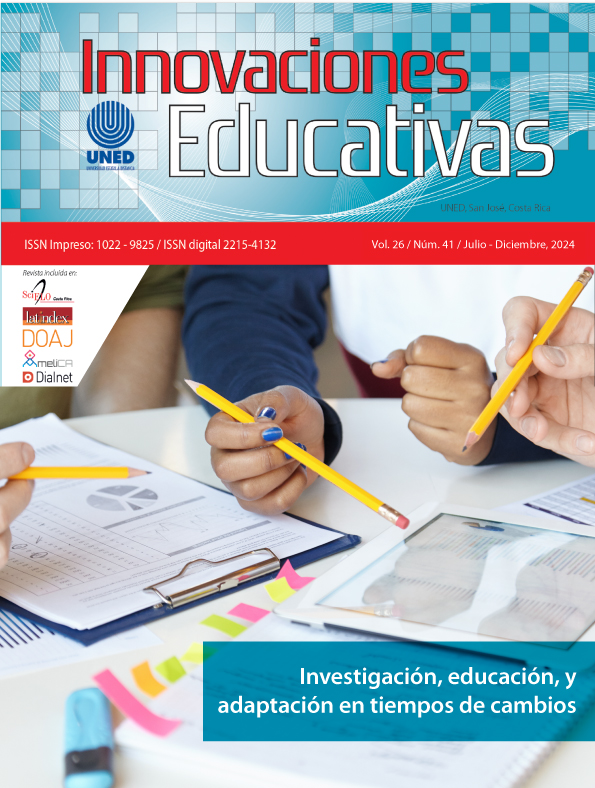Teachers' Perception of the Ethical Use of Artificial Intelligence in their Educational Work
DOI:
https://doi.org/10.22458/ie.v26i41.4952Keywords:
Learning, Education, Teacher Innovation, Emerging Technologies, Artificial IntelligenceAbstract
The main objective of the article is to analyze the perception of Costa Rican teachers regarding the ethical use of Artificial Intelligence (AI) in their educational work. The paper deals with AI in education, its definition, characteristics and how it is perceived by Costa Rican teachers at the elementary, high school and university levels. It also discusses the ethical considerations regarding its use for educational purposes and the diversity of AI tools, their application and the experiences that teachers have had with them. The research was conducted using a concurrent mixed methods approach and relied on descriptive analysis techniques. For data collection, 134 teachers from all educational backgrounds in Costa Rica responded to a questionnaire. The data were analyzed using qualitative and quantitative strategies. The results show that teachers have limited knowledge about the use of Artificial Intelligence for educational purposes. Also, although some of them consider that AI could be useful to support students, they are not aware of the possibilities that AI offers to adapt content for individualized learning. The article concludes that teachers are aware of the importance of the AI approach and the ethical implications of using it in the classroom. Finally, there is a need for better training on how to best use AI tools.
References
Alharbi, J. S. N. y Köprülü, F. (2024). The views of the teachers on artificial intelligence's effects on the education process. Synesis, 16(1), 314-325. https://seer.ucp.br/seer/index.php/synesis/article/view/2930
Arias, J. y Covinos, M. (2021). Diseño y Metodología de la Investigación. Enfoques Consulting EIRL. https://www.academia.edu/69037546/Arias_Covinos_Dise%C3%B1o_y_metodologia_de_la_investigacion_1_
Azuaje-Pirela, M. (2021). Estrategia nacional de IA y Propiedad Intelectual: algunos temas cruciales. Universidad Autónoma de Chie.
Carballo, P. F. (2021). La propiedad intelectual de las obras creadas por IA. ARANZADI/ CIVITAS.
Chan, C. K. Y. (2023). A comprehensive AI policy education framework for university teaching and learning. International journal of educational technology in higher education, 20(1), 38. https://link.springer.com/content/pdf/10.1186/s41239-023-00408-3.pdf
Codina, L. (10 de octubre de 2023). Cómo utilizar ChatGPT en el aula con perspectiva ética y pensamiento crítico: una proposición para docentes y educadores. Blog de Lluís Codina. Recuperado el 4 de marzo de 2024 de https://www.lluiscodina.com/chatgpt-educadores/
De Ibarrola, M. (abril de 2016). Dilemas de futuro para la educación y la formación técnico profesional en America Latin. UNESCO.
https://unesdoc.unesco.org/ark:/48223/pf0000371203
Domínguez, R. (2020). Nuevas Tecnologías y Educación en el siglo XXI. Revista Ética Net, 4, 1-13. https://www.ugr.es/~sevimeco/revistaeticanet/Numero4/Articulos/Formateados/NTIC_SXXI.pdf
Favreau, J. (director). (2008). Iron Man [Película]. Marvel Studios.
Figueroa, J. F., Ochoa, M. A. R., Zallas, F. A. E., & Guajardo, J. A. (2022). Los nuevos paradigmas de la Inteligencia artificial aplicados a la educación. Revista de Investigación Académica sin Frontera, 3(38), 5. https://dialnet.unirioja.es/servlet/articulo?codigo=8728008
Figueroa, M. y Ochoa, X. (2019). Los nuevos paradigmas de la IA: desafíos éticos para la educación. Revista Iberoamericana de Educación a Distancia, 22(2), 173-192. https://www.semanticscholar.org/paper/Los-nuevos-paradigmas-de-la-Inteligencia-artificialFigueroaOchoa/3bca1190b5acbd7bb5e9f13c94276bdf88991818
Floridi, L. y Cowls, J. (2019). A unified framework of five principles for AI in society. Harvard Data Science Review, 1(1). https://www.researchgate.net/publication/334166840_A_Unified_Framework_of_Five_Principles_for_AI_in_Society
García, M. (2019). Perception of teachers towards ethical use of artificial intelligence in higher education. International Journal of Progressive Education, 15(1), 90-108.
Hernández, R. y Mendoza, C. (2018). Metodología de la investigación. Las rutas cuantitativa, cualitativa y mixta. McGraw-Hill
Kizilcec, R. F. (2023). To Advance AI Use in Education, Focus on Understanding Educators. International Journal of Artificial Intelligence in Education, 1-8. https://link.springer.com/article/10.1007/s40593-023-00351-4
Lopezosa, C. y Codina L. (2023). CAQDAS para el análisis cualitativo de entrevistas: pasos para combinar la IA de OpenAI con ATLAS.ti, Nvivo y MAXQDA. Universitat Pompeu Fabra, Departament de Comunicació. http://hdl.handle.net/10230/55477
Mâță, L., Clipa, O., y Tzafilkou, K. (2020). The development and validation of a scale to measure university teachers’ attitude towards ethical use of information technology for a sustainable education. Sustainability, 12(15), 6268. https://www.mdpi.com/2071-1050/12/15/6268
Marconi, F. y Siegman, A. (2017). A guide for newsrooms in the age of smart machines. The Associated Press.https://insights.ap.org/uploads/images/the-future-of-augmented-journalism_ap-report.pdf
Mar, C., Barbosa, A., y Molar, J. (2020). Metodología de la investigación. Métodos y técnicas. Patria Educación.
Miao, F., Holmes, W., Huang, R. y Zhang, H. (2021). AI and education: guidance for policymakers. UNESCO. https://doi.org/10.54675/PCSP7350
Murphy, K., Di Ruggiero, E., Upshur, R., Willison, D. J., Malhotra, N., Cai, J. C. y Gibson, J. (2021). Artificial intelligence for good health: a scoping review of the ethics literature. BMC medical ethics, 22(1), 1-17. https://bmcmedethics.biomedcentral.com/articles/10.1186/s12910-021-00577-8
Nguyen, A., Ngo, H. N., Hong, Y., Dang, B. y Nguyen, B. P. T. (2023). Ethical principles for artificial intelligence in education. Education and Information Technologies, 28(4), 4221-4241. https://link.springer.com/content/pdf/10.1007/s40593-021-00239-1.pdf
Wang, R., Chen, J., & Albattat, A. (2023). The opportunities and challenges of artificial intelligence (AI) application in education: Literature review. International Journal of Multidisciplinary Research and Publications (IJMRAP), 6(1), 1-5. https://ijmrap.com/wp-content/uploads/2023/06/IJMRAP-V5N12P195Y23.pdf
Whedon, J. (director). (2012). The Avengers [Película]. Marvel Studios.
Downloads
Published
How to Cite
Issue
Section
License
Copyright (c) 2024 Innovaciones Educativas

This work is licensed under a Creative Commons Attribution-NonCommercial-NoDerivatives 4.0 International License.

